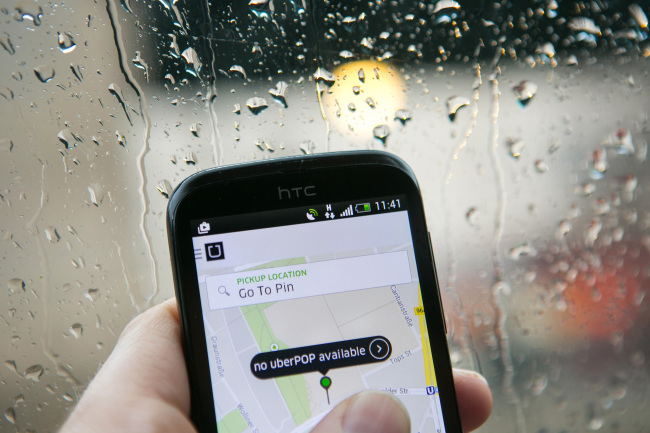The Korea Communications Commission, the nation’s top telecom regulator, said Thursday it would file a complaint against Uber Korea with the prosecution on charges of violating laws related to telecommunication information.
The decision came after the Seoul Metropolitan Government requested last week that the state regulator ban Uber’s services, which it said had breached laws related to location-based services.
|
|
|
(Bloomberg) |
The local government has stepped up its efforts to keep the taxi-hailing app out of the city since last year. It has filed complaints with the prosecution against the Korean office of the California-based Uber Technologies and its chief executive Travis Kalanick, claiming that it broke Korean transportation laws by allowing privately owned vehicles to be mobilized for commercial transportation businesses. It has also fined Uber drivers and rewarded those who report drivers working with Uber services.
“Uber Korea violated the laws that require businesses dealing with location information to register at the KCC to prove they properly protect the data,” said the KCC in a statement released after a general meeting with committee members.
Those who breach the rules can face a prison term of up to three years or a maximum fine of up to 30 million won ($28,000), according to the KCC. “Despite the convenience created by the convergence between IT and taxi services, technology will not be beneficial to the public if it does not comply with the laws and institutional processes,” said Kim Jae-hong, a KCC committee member, at the meeting.
Agreeing with Kim that protecting private information was more important than seeking convenience from technology, Ko Sam-seok, another committee member, said, “Uber Technology should have tried to solve social and legal controversies related to its services in the first place rather than pushing to proceed with their controversial business model in Korea.”
Uber Technologies has not yet responded to the KCC’s decision.
Some market watchers, meanwhile, expressed concerns over strict regulations for IT businesses that seemingly disrupt conventional businesses.
“Uber first brought changes to the established taxi and IT industries, but now it faces obstacles from the authorities. Too many regulations could suppress innovation,” an industry official said.
By Kim Young-won (wone0102@heraldcorp.com)


